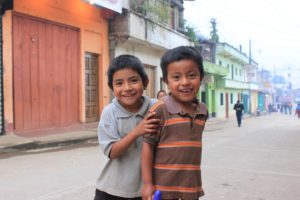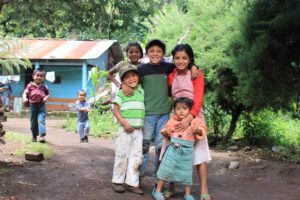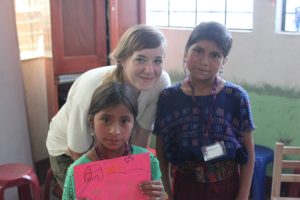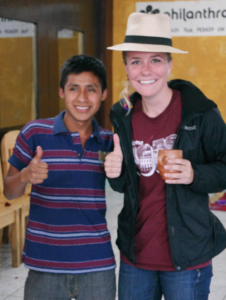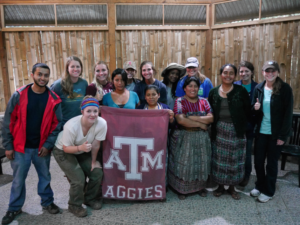The ten days I recently spent in Guatemala have given me a deeper appreciation for the role of “family” in the Maya culture. The first observation I made while in-country were the holding of hands among the indigenous populations. When one thinks of holding hands, it often serves as reference between a woman and a man. However, I interpreted this symbolism in Guatemala as a representation of their value for each member of the family. This is a country in which half of its population lives in poverty, and the agriculture sector employs half of all Guatemalans. So the role of each family member, whether male or female, is necessary for survival of the entire household.
For example, women are expected to maintain their domestic responsibilities, whereas men are expected to work out in the fields. These culturally appropriate, gender roles became apparent during our visits to indigenous villages such as Zaculeu and Jaibalito; in the Panajachel region of Guatemala. Although these indigenous men and women continuously face hardships, they still maintain their value for each other and demonstrate pride in both their work and cultural beliefs.
While working on soil conservation projects with a pea-farmer’s cooperative in Zaculeu, I found it enlightening that the farmers were genuinely fulfilled with the minimal acreage they owned.
The first remark that struck me was when Don Eńildo, leading member of the pea-cooperative, stated in Spanish, “Si estás en contra de la tierra, entonces usted está en contra de Dios.”
When translated to English the statement reads, “If you are against the land, then you are against God.”
As a member of the Kaqchikel Maya Tribe, Don Eńildo exemplified his cultural beliefs in both maintaining and respecting the land provided to him and the cooperative members. And it is through this value system that both the land and farmers whom are beneficiaries will continue to progress.
Another observation I made while in-country were Maya women’s role as preservers of culture. Not only were these indigenous women expected to fulfill their role in the family, but they were also expected to maintain their cultural identity dependent on their Maya Tribe. While visiting the artisan market in Jaibalito, it became apparent these indigenous women took pride in their craftsmanship, and even more in telling the story of their tribe through the textiles. I couldn’t tell you if I enjoyed more looking at these colorful huipil designs, or speaking with the indigenous women who shared their stories with me. When I would explain that I am of Mexican descent, nearly every woman I spoke with would express how important it is for me to know my native language.
A member of the K’iche Maya Tribe, Dońa Catalina, explained to me that although her people endured genocide during the 36 year Civil War in Guatemala; the government of the country was unable to eradicate the 21 recognized Mayan languages of this largely indigenous population.
She stated in Spanish, “Los guerrilleros pueden haber tomado nuestra tierra y sus seres queridos, pero eran incapaces de tomar nuestra identidad y el lenguaje. Es a través de nuestra fe que hemos surgido de tales injustice, y es a través de nuestra lengua y cultura que vamos a seguir compartiendo nuestras historias.”
When translated to English the statement reads, “The guerrillas may have taken our land and loved ones, but they were unable to take our identity and language. It is through our faith that we have arisen from such injustice, and it is through our language and culture that we will continue to share our stories.”
In retrospect, I have gained further understanding of gender roles inclined by the Maya culture, and how both men and women serve as integral parts in the development of this indigenous value system. Given my Mexican heritage is a remnant of an indigenous population, I have a newfound respect for the preservation of culture among the Mayans. I empathize with both Don Eńildo and Dońa Catalina, and agree that their cultural beliefs will enable their Maya Tribes to flourish. My only hope is that I can return to Guatemala in my future career as a Foreign Service Officer and learn new stories from these dedicated, Mayan story-tellers.
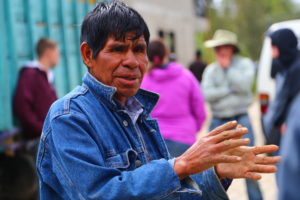
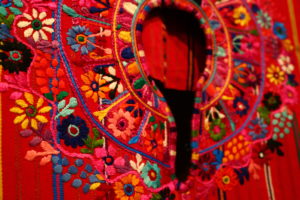
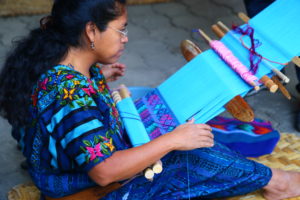
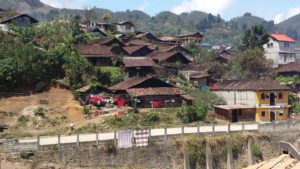
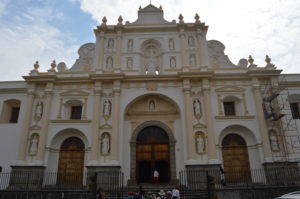
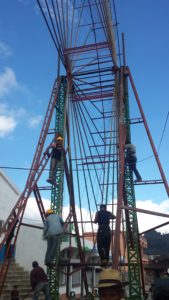
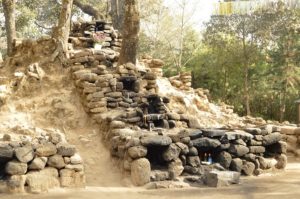
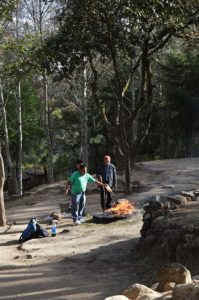
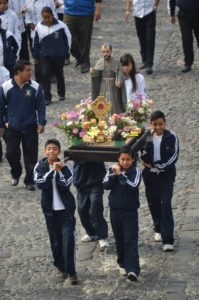
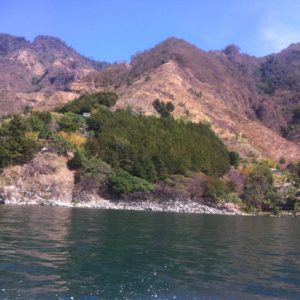
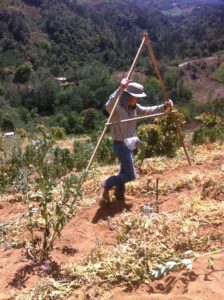 many cooperatives in the country. The cooperative contains 150 members made up of the local farmers. We worked with Alexa, a Peace Corps Volunteer assigned to assist local farmers with soil conservation and more efficient ways of farming. We had the privilege to work with Alexa and the cooperative on their farm plots. We measured contour lines with A-frames (see picture) that we constructed prior to going into the fields. The farmers constructed live barriers where we had placed the contour lines to help stop soil erosion.
many cooperatives in the country. The cooperative contains 150 members made up of the local farmers. We worked with Alexa, a Peace Corps Volunteer assigned to assist local farmers with soil conservation and more efficient ways of farming. We had the privilege to work with Alexa and the cooperative on their farm plots. We measured contour lines with A-frames (see picture) that we constructed prior to going into the fields. The farmers constructed live barriers where we had placed the contour lines to help stop soil erosion.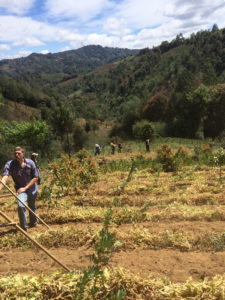 slopes on which these farmers worked. I am from Weslaco, a town in south Texas where we have a family farm: I am used to almost perfectly level fields. So, to see farmers surviving, thriving, and making a living on mountains slopes, is quite amazing in my eyes. They do all work by hand, whether plowing, planting, spraying, or harvesting. There are no tractors or machines because of the terrain. Farmers not only walk, but carry all their equipment to the fields.
slopes on which these farmers worked. I am from Weslaco, a town in south Texas where we have a family farm: I am used to almost perfectly level fields. So, to see farmers surviving, thriving, and making a living on mountains slopes, is quite amazing in my eyes. They do all work by hand, whether plowing, planting, spraying, or harvesting. There are no tractors or machines because of the terrain. Farmers not only walk, but carry all their equipment to the fields.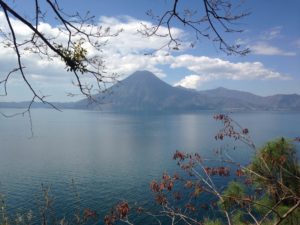 The popular perception is that Guatemala is a thieving, dangerous, and extremely poor country. Turns out that a tourist will have a great experience, as long as you have an experienced guide, stay in a group, and you are careful without being just plain stupid. I didn’t know how hard it would be to get information, research, and/or evidence in Guatemala, but I found out that it was surprisingly easy. For the most part, there are translators and meetings that are already set up for us by our guide to address questions or concerns. The culture and people are also very friendly and patient with you when you have a question or if you are just trying to communicate.
The popular perception is that Guatemala is a thieving, dangerous, and extremely poor country. Turns out that a tourist will have a great experience, as long as you have an experienced guide, stay in a group, and you are careful without being just plain stupid. I didn’t know how hard it would be to get information, research, and/or evidence in Guatemala, but I found out that it was surprisingly easy. For the most part, there are translators and meetings that are already set up for us by our guide to address questions or concerns. The culture and people are also very friendly and patient with you when you have a question or if you are just trying to communicate.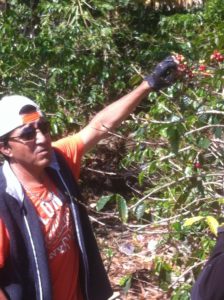 In Guatemala, everything is about building relationships and working with others. If you are able to build a relationship or connection with someone, you can easily get connected with many others. For example, our amazing driver on the “Juancho Expedicion” got us connected with a boat driver, and he also participated in helping us ask questions to key individuals such as the head persons of the urban water development team.
In Guatemala, everything is about building relationships and working with others. If you are able to build a relationship or connection with someone, you can easily get connected with many others. For example, our amazing driver on the “Juancho Expedicion” got us connected with a boat driver, and he also participated in helping us ask questions to key individuals such as the head persons of the urban water development team.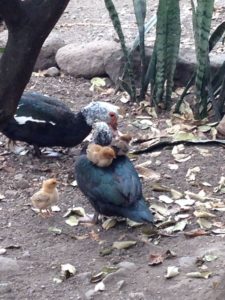
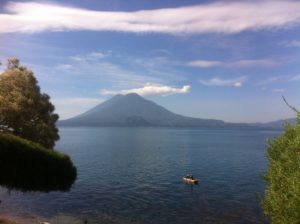
 Repeat that five times a week and that is my life. The corps’ lifestyle is like warp speed compared to Guatemala. Let’s convert my day into Guatemala time. First, take that 15-20 minute breakfast and multiply it by five, maybe six times. If you think that is long, dinner can start at 7:30 and end at 10:00; there is no rush here. It is certainly a lifestyle I could get use to. You may chalk that up to a vacation-like atmosphere that a tourist might attract, but from my observations that could not be farther from the truth.
Repeat that five times a week and that is my life. The corps’ lifestyle is like warp speed compared to Guatemala. Let’s convert my day into Guatemala time. First, take that 15-20 minute breakfast and multiply it by five, maybe six times. If you think that is long, dinner can start at 7:30 and end at 10:00; there is no rush here. It is certainly a lifestyle I could get use to. You may chalk that up to a vacation-like atmosphere that a tourist might attract, but from my observations that could not be farther from the truth.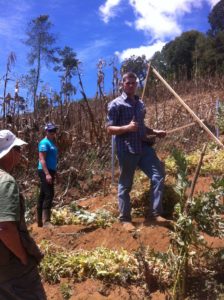 ldo’s farm, made compost piles on-site, and were able to pick an entire field of peas. We were there for two days folks and only did six hours of work, and a whole bunch of talking. As a side note, we also made a little pizza for lunch (10 pizzas actually).
ldo’s farm, made compost piles on-site, and were able to pick an entire field of peas. We were there for two days folks and only did six hours of work, and a whole bunch of talking. As a side note, we also made a little pizza for lunch (10 pizzas actually).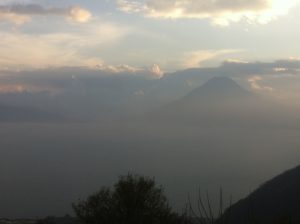 observed. I would rather enjoy it for as long as I can and it’s something I believe you must experience to truly appreciate what I’ve discovered.
observed. I would rather enjoy it for as long as I can and it’s something I believe you must experience to truly appreciate what I’ve discovered.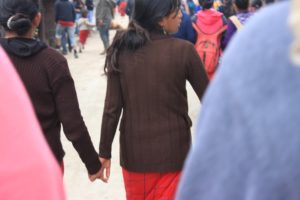
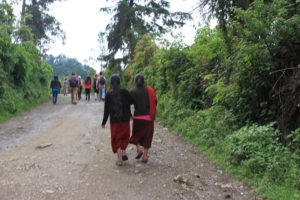 Chajulense women holding hands while walking down the street.
Chajulense women holding hands while walking down the street.